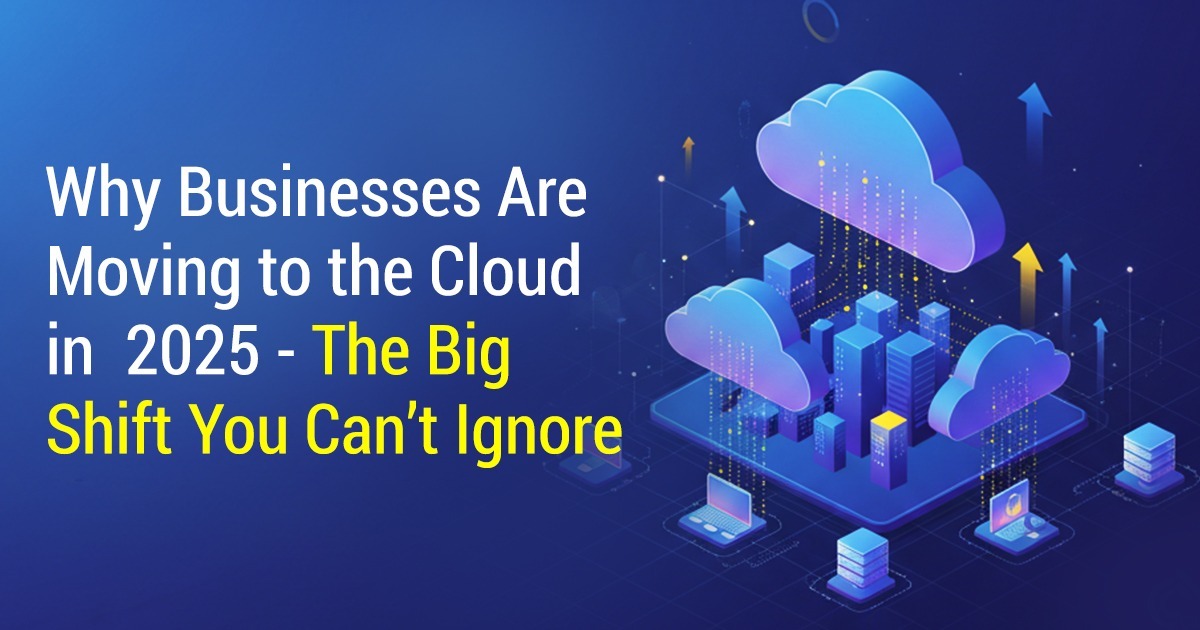
Why Businesses Are Moving to the Cloud in 2025 — The Big Shift You Can’t Ignore
Everywhere you look in 2025, businesses are embracing one major transformation — the shift to cloud computing. What once seemed like a future trend has now become the new normal. From small startups to global enterprises, everyone is realizing that running on the cloud isn’t just about keeping up with technology — it’s about staying competitive, secure, and ready for what’s next.
In this blog, we’ll explore why businesses are rapidly shifting to the cloud, the key benefits driving this change, and how this transformation is shaping the future of work.
What Is Cloud Computing in Simple Terms?
Before diving into the reasons, let’s quickly understand what cloud computing means.
Cloud computing allows businesses to store data, run applications, and access software over the internet instead of relying on local servers or computers. In simple words, the cloud is like renting powerful computing resources that you can access anytime, from anywhere, without having to manage expensive hardware yourself.
Platforms like Amazon Web Services (AWS), Microsoft Azure, and Google Cloud are leading this revolution by offering secure and scalable cloud services for every kind of business need.
1. Cost Efficiency — Pay Only for What You Use
One of the biggest reasons behind the cloud migration trend in 2025 is cost savings.
Traditionally, companies had to buy and maintain costly servers, storage systems, and IT infrastructure. These setups required large upfront investments and ongoing maintenance costs.
With the cloud, businesses pay only for what they use — like paying an electricity bill. This flexible, pay-as-you-go model helps reduce unnecessary expenses and makes it easier for even small businesses to scale affordably.
2. Flexibility and Scalability — Grow Without Limits
Imagine your business suddenly gets more customers or new projects. With traditional systems, you might struggle to add more servers or storage in time.
In the cloud, scaling up or down is instant. You can increase your computing power or storage within minutes — no waiting, no hardware issues.
This flexibility allows businesses to adapt quickly to market changes, new opportunities, or seasonal demands without disruption.
3. Better Security and Data Protection
Many people once believed storing data in the cloud was risky. But in 2025, that perception has completely changed.
Top cloud providers now offer world-class security — including data encryption, multi-factor authentication, and 24/7 monitoring. These advanced features protect against cyber threats far better than most on-premises systems.
Additionally, cloud platforms automatically back up data, reducing the risk of data loss due to hardware failure or natural disasters.
4. Remote Work and Global Accessibility
The rise of remote and hybrid work has made cloud technology more important than ever.
When your data and applications live in the cloud, your employees can access everything securely from anywhere — whether they’re at the office, home, or traveling.
This global accessibility supports collaboration across teams and time zones, making operations more connected and efficient.
5. Improved Performance and Innovation
Cloud computing provides access to high-performance technologies like AI, Machine Learning, Big Data Analytics, and Internet of Things (IoT) — without the need to build complex systems internally.
This helps businesses make faster decisions, analyze data in real time, and create new products or services quickly. Simply put, the cloud accelerates innovation.
6. Business Continuity and Disaster Recovery
Unexpected events — like system failures or natural disasters — can bring business operations to a halt.
With cloud-based Disaster Recovery (DR) solutions, companies can restore data and applications almost instantly. This ensures minimal downtime and helps maintain smooth business continuity.
Organizations today are choosing reliable cloud service partners who design and manage disaster recovery systems that protect their data and ensure operations run without interruption.
7. Sustainability and Green IT
More companies today are focusing on sustainability. Cloud computing plays a big role here too.
Since data centers are optimized for energy efficiency and shared among multiple users, cloud computing reduces overall carbon emissions compared to traditional IT setups.
By moving to the cloud, businesses are not just improving performance — they’re also making an eco-friendly choice.
The Big Shift Is Already Happening
The cloud migration wave is growing stronger every year. In 2025, most modern businesses are either fully on the cloud or in the process of transitioning.
Whether it’s cost reduction, flexibility, or security — the advantages are simply too powerful to ignore. Organizations that embrace cloud technology are moving faster, innovating smarter, and delivering better customer experiences.
If your business hasn’t started its cloud journey yet, now is the time to act.
The Cloud Is the Future
The shift to cloud computing is not just a technology upgrade — it’s a complete business transformation. Companies that take the leap are discovering new levels of agility, efficiency, and resilience.
While every organization’s journey is different, partnering with experienced cloud professionals can make the transition smoother and more strategic. The right approach ensures your cloud environment is secure, cost-efficient, and tailored to your goals.
In 2025 and beyond, the cloud will continue to be the foundation of innovation and business success. Those who embrace it today will lead tomorrow’s digital economy.
